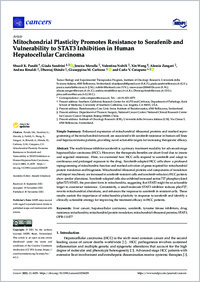Mitochondrial plasticity promotes resistance to sorafenib and vulnerability to STAT3 inhibition in human hepatocellular carcinoma
- Pandit, Shusil K Southern California Research Center for ALPD and Cirrhosis, Department of Pathology, Keck School of Medicine, University of Southern California, Los Angeles, USA.
- Sandrini, Giada ORCID Bioinformatics Core Unit, Swiss Institute of Bioinformatics, Bellinzona, Switzerland - Institute of Oncology Research (IOR), Faculty of Biomedical Sciences, Università della Svizzera italiana, Switzerland
- Merulla, Jessica Institute of Oncology Research (IOR), Faculty of Biomedical Sciences, Università della Svizzera italiana, Switzerland
- Nobili, Valentina Institute of Oncology Research (IOR), Faculty of Biomedical Sciences, Università della Svizzera italiana, Switzerland
- Wang, Xin Department of Thoracic Surgery, National Cancer Center/National Clinical Research Center for Cancer/Cancer Hospital, Beijing, China
- Zangari, Alessia Institute of Oncology Research (IOR), Faculty of Biomedical Sciences, Università della Svizzera italiana, Switzerland
- Rinaldi, Andrea Institute of Oncology Research (IOR), Faculty of Biomedical Sciences, Università della Svizzera italiana, Switzerland
- Shinde, Dheeraj Institute of Oncology Research (IOR), Faculty of Biomedical Sciences, Università della Svizzera italiana, Switzerland
- Carbone, Giuseppina M. ORCID Institute of Oncology Research (IOR), Faculty of Biomedical Sciences, Università della Svizzera italiana, Switzerland
- Catapano, Carlo V. ORCID Institute of Oncology Research (IOR), Faculty of Biomedical Sciences, Università della Svizzera italiana, Switzerland
- 2021
Published in:
- Cancers. - 2021, vol. 13, no. 23, p. 6029
Liver cancer
Hepatocellular carcinoma
Sorafenib
Tyrosine kinase inhibitors
Drug resistance
Mitochondria
Mitochondrial protein translation
Mitochondrial ribosomal proteins
STAT3
OPB-111077
English
The multi-kinase inhibitor sorafenib is a primary treatment modality for advanced-stagehepatocellular carcinoma (HCC). However, the therapeutic benefits are short-lived due to innateand acquired resistance. Here, we examined how HCC cells respond to sorafenib and adapt tocontinuous and prolonged exposure to the drug. Sorafenib-adapted HCC cells show a profoundreprogramming of mitochondria function and marked activation of genes required for mitochondrialprotein translation and biogenesis. Mitochondrial ribosomal proteins and components of translationand import machinery are increased in sorafenib-resistant cells and sorafenib-refractory HCC patientsshow similar alterations. Sorafenib-adapted cells also exhibited increased serine 727 phosphorylated(pSer727) STAT3, the prevalent form in mitochondria, suggesting that STAT3 might be an actionabletarget to counteract resistance. Consistently, a small-molecule STAT3 inhibitor reduces pSer727,reverts mitochondrial alterations, and enhances the response to sorafenib in resistant cells. Theseresults sustain the importance of mitochondria plasticity in response to sorafenib and identify aclinically actionable strategy for improving the treatment efficacy in HCC patients.
- Collections
- Language
-
- English
- Classification
- Medicine
- License
- Open access status
- gold
- Identifiers
-
- DOI 10.3390/cancers13236029
- ARK ark:/12658/srd1321226
- Persistent URL
- https://n2t.net/ark:/12658/srd1321226
Statistics
Document views: 228
File downloads:
- Catapano_2021_MDPI_cancers: 241
